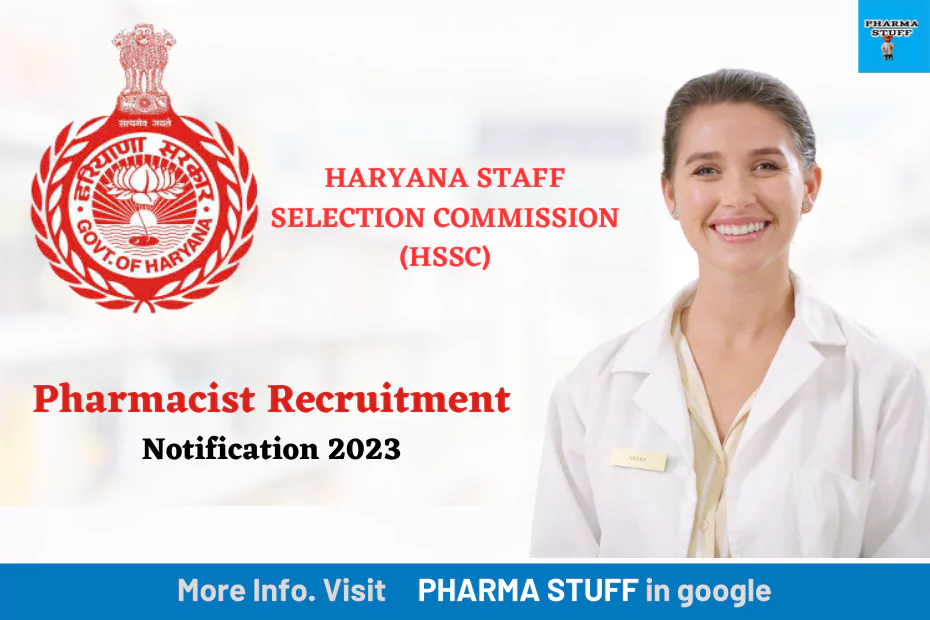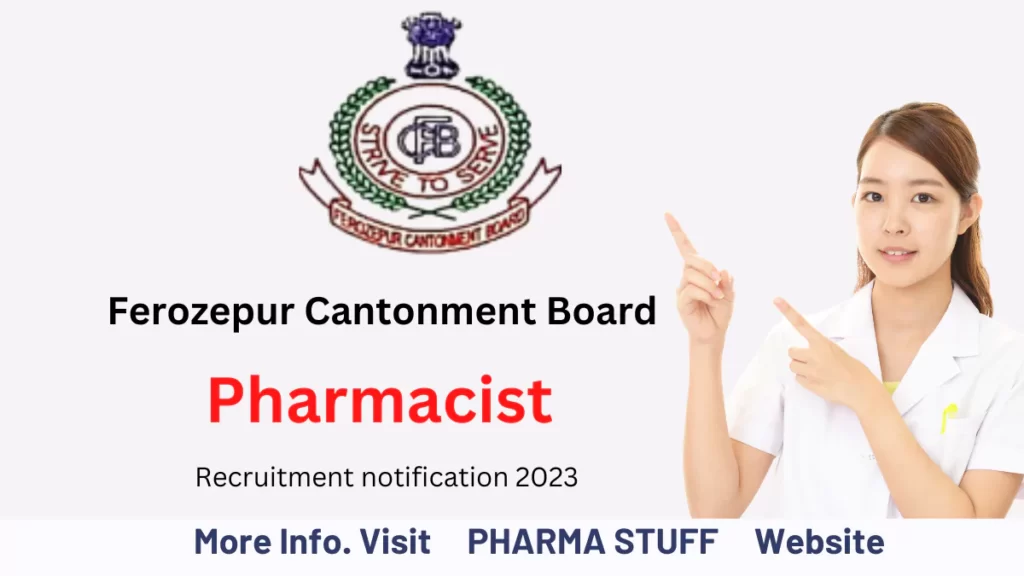Haryana Staff Selection Commission pharmacist Recruitment notification 2023

Haryana Staff Selection Commission Govt Pharmacist Recruitment Notification 2023
256 Posts of Various Departments/Board/Corporations etc. in Group 15
Name of Department: DHBVN
Name of Post: PHARMACIST
Total Number of Posts: 09
Department: ESI healthcare
Designation: Pharmacist
Total No. Of Posts: 133
👉 Never Miss a Pharma Job Again
💼 Join our LIVE WhatsApp Group & Get Instant Updates. 📢 Click below to join:
📱 Join Click HereName of Department: Health
Name of Post: Pharmacist
Total Number of Posts: 108
Essential Education Qualification for the post of Cat. No. 136 to 139
i) Matriculation or equivalent examination with science from Haryana Education Board or any other Education Board or University recognized by the State Government of Haryana.
ii) Having a Diploma in Pharmacy from an institution recognized by the State Government of Haryana.
Note:– The persons having higher qualifications and experience will be preferred.
i) 10+2 with Science physics and chemistry
ii) Diploma from recognized institutions that are recognized by Haryana Govt.
Iii) Registered as a Pharmacist with Haryana Pharmacy Council (HPC) B. Pharmacy with minimum 50% marks or BSc. with Chemistry;
i) 10+2 with Science physics and chemistry
ii) Bachelor in Pharmacy (Four Years Degree) or Bachelor in Pharmacy (Practice) or Pharma D. (Six Years Degree) from Pandit Bhagwat Dayal Sharma University of Health Sciences, Rohtak, or any other institution recognized by the Haryana Government;
iii) At least six months training as Pharmacist in Pharmacy, injections, dressing, and indoor in a recognized Hospital;
iv) Registered as a Pharmacist with the Haryana State Pharmacy Council under section 31(a) or 31(c) or 31 (a) of the Pharmacy Act. 1948 as applicable to Haryana State;
Essential Qualification for all posts: –
i) Hindi or Sanskrit as one of the subjects in Matric or Higher Education.
ii) Age: 18-42 for all categories except Cat. No. 368 & 369.
iii) Age for Cat. No. 368: 18-22.
iv) Age for Cat. No. 369: 18-26.
v) Age relaxation as per instructions of Haryana Govt (for SC/BC-A/BC-B/PWD/ESM etc of Haryana for detail please see Para-10 of the Advertisement).

SYLLABUS;
Pharmaceutical Jobs (Level- Matric+ Diploma in Pharmacy)
1) General awareness, Reasoning, Mathematics, Science, and History including Haryana-related history, current affairs, literature, Geography, Civics, Environment, Culture, etc.- (Weightage 20%)
2) Computer terminology, Fundamentals, word software, excel software, Powerpoint, internet, web browsing, Communication, emails, downloading and uploading data on websites, etc. – (Weightage 10%)
3) Subject-related syllabus- (Weightage 70%)
————————————————————————————————————————————–
PHARMACEUTICS
History of the profession of Pharmacy in India in relation to Pharmacy education, industry, pharmacy practice, and various professional associations, Salient features of Indian Pharmacopoeia, Packaging materials, Preservatives, Unit operations, Size reduction, Size separation, Filtration, Drying, Extraction, Tablets, Capsules, Liquid oral preparations – solution, syrup, elixir, emulsion, suspension, dry powder for reconstitution, Topical preparations, Powders and granules, Sterile formulations, Immunological products, Quality control, and quality assurance, Introduction to the concept of calibration and validation, Novel drug delivery systems.
PHARMACEUTICAL CHEMISTRY
Introduction to Pharmaceutical Chemistry, Sources, and types of errors, Impurities in Pharmaceuticals, Volumetric analysis, Gravimetric analysis, Inorganic Pharmaceuticals, Haematinics, Gastro-intestinal Agents, Topical agents, Dental products, Medicinal gases, and Drugs Acting on the Central Nervous System: Anesthetics, Sedatives and Hypnotics, Antipsychotics, Anticonvulsants, Anti-Depressants, Drugs Acting on Autonomic Nervous System: Sympathomimetic Agents, Adrenergic Antagonists, Cholinergic Drugs and Related Agents, Cholinergic Blocking Agents, Synthetic Cholinergic Blocking Agents, Drugs Acting on Cardiovascular System: Anti-Arrhythmic Drugs, Anti-Hypertensive Agents, Antianginal Agents, Diuretics, Hypoglycaemic Agents, Analgesic And Anti-Inflammatory Agents, Anti-Infective Agents: Antifungal Agents, Urinary Tract Anti-Infective Agents, Anti-Tubercular Agents, Antiviral Agents, Antimalarials, Sulphonamides, Antibiotics, Tetracyclines, Macrolides, Anti-Neoplastic Agents.
PHARMACOGNOSY
Definition, history, present status and scope of Pharmacognosy, Classification of drugs, Quality control of crude drugs, Brief outline of occurrence, distribution, isolation, identification tests, therapeutic activity and pharmaceutical applications of alkaloids, terpenoids, glycosides, volatile oils, tannins and resins, Biological sources, chemical constituents, and therapeutic efficacy of crude drugs: Laxatives, Cardiotonic, Carminatives and G.I. regulators, Astringents, Drugs acting on the nervous system, Antihypertensive, Anti-tussive, Anti-rheumatics, Anti-tumour, Antidiabetics, Diuretics, Anti-dysenteric, Antiseptics and disinfectants, Antimalarials, Oxytocic, Vitamins, Pharmaceutical Aids, Enzymes, Plant fibers used as surgical dressings, Basic principles involved in the traditional systems of medicine, Method of preparation of Ayurvedic formulations, Role of medicinal and aromatic plants in the national economy and their export potential, Herbs as a health food, Introduction to herbal formulations, Herbal
cosmetics, and Phytochemical investigation of drugs.
HUMAN ANATOMY AND PHYSIOLOGY
Scope of Anatomy and Physiology Definition of various terminologies, Structure of Cell, Tissues of the human body, Osseous system, Haemopoietic system, Lymphatic system, Cardiovascular system, Respiratory system, Digestive system, Skeletal muscles, Nervous system, Sense organs – Anatomy and physiology, Urinary system, Endocrine system (Hormones and their functions), and Reproductive system.
SOCIAL PHARMACY
Introduction to Social Pharmacy, Preventive healthcare – Role of Pharmacists, Nutrition and Health, Introduction to Microbiology and common microorganisms, Epidemiology, Introduction to health systems and all ongoing National Health programs in India, their objectives, functioning, outcome, and the role of pharmacists, Pharmacoeconomics.
PHARMACOLOGY
General Pharmacology, Drugs Acting on the Peripheral Nervous System, Drugs Acting on the Eye, Drugs Acting on the Central Nervous System, Drugs Acting on the Cardiovascular System, Drugs Acting on Blood and Blood Forming Organs, Definition, classification, pharmacological actions, dose, indications, and contraindications, Drugs Acting on the Gastro-Intestinal Tract, Drugs Acting on the Kidney, Hormones, and Hormone Antagonists, Autocoids, Chemotherapeutic Agents, Biologicals.
COMMUNITY PHARMACY AND MANAGEMENT
Community Pharmacy Practice, Professional responsibilities of community pharmacists, Introduction to the concept of Good Pharmacy Practice and SOPs, Prescription and prescription handling, Communication skills, Patient counseling, Stages of patient counseling, Barriers to effective counseling, Patient counseling points for chronic diseases/disorders, Patient Package Inserts, Patient Information leaflets, Medication Adherence, Health Screening Services in Community Pharmacy, Over Counter (OTC) Medications, and Community Pharmacy Management.
BIOCHEMISTRY & CLINICAL PATHOLOGY
Introduction to biochemistry, Carbohydrates, Proteins, Lipids, Nucleic acids, Enzymes, Vitamins, Metabolism, Minerals, Water, and Electrolytes, Introduction to Biotechnology, Organ function tests, Introduction to Pathology of Blood and Urine.
PHARMACOTHERAPEUTICS
Pharmacotherapeutics – Introduction, scope, and objectives. Rational use of Medicines, Evidence-Based Medicine, Essential Medicines List, Standard Treatment Guidelines (STGs), Definition, etiopathogenesis, clinical manifestations, non-pharmacological and pharmacological management of the diseases associated with Cardiovascular System, Respiratory System, Endocrine System, Central Nervous System, Gastro-Intestinal Disorders, Haematological disorders, Infectious diseases, Musculoskeletal disorders, Dermatology, Psychiatric Disorders, Ophthalmology, Anti-microbial Resistance, Women’s Health.
HOSPITAL AND CLINICAL PHARMACY
Hospital Pharmacy, Different Committees in the Hospital, Supply Chain and Inventory Control, Drug distribution, and Compounding in Hospitals. Bulk compounding, IV admixture services, incompatibilities, Total parenteral nutrition, Radio Pharmaceuticals, Application of computers in Hospital Pharmacy Practice, Electronic health records, Software used in hospital pharmacy, Clinical Pharmacy, Daily activities of clinical pharmacists, Pharmaceutical care, Medication Therapy Management, Home Medication Review, Clinical laboratory tests used in the evaluation of disease states – significance and interpretation of test results, Poisoning, Pharmacovigilance, Medication errors, Drug Interactions.
PHARMACY LAW AND ETHICS
General Principles of Law, History, and various Acts related to Drugs and the Pharmacy profession, Pharmacy Act-1948 and Rules, Pharmacy Practice Regulations 2015, Drugs and Cosmetics Act 1940 and Rules 1945 and New Amendments, Manufacture of drugs, Sale of Drugs, Administration of the Act and Rules, Narcotic Drugs, and Psychotropic Substances Act 1985 and Rules, Drugs and Magic Remedies (Objectionable Advertisements) Act 1954, Prevention of Cruelty to Animals Act-1960, Poisons Act-1919, FSSAI (Food Safety and Standards Authority of India) Act and Rules, National Pharmaceutical Pricing Authority, Code of Pharmaceutical Ethics, Medical Termination of Pregnancy Act and Rules – basic understanding, salient features, and Amendments, Role of all the government pharma regulator bodies Central Drugs Standards Control Organization (CDSCO), Indian Pharmacopoeia Commission (IPC), Good Regulatory practices (documentation, licenses, renewals, e-governance) in Community Pharmacy, Hospital pharmacy, Pharma Manufacturing, Wholesale business, inspections, import, export of drugs and medical devices, Introduction to BCS system of classification, Basic concepts of Clinical Trials, ANDA, NDA, New Drug development, New Drugs and Clinical Trials Rules, 2019. Brand v/s Generic, Trade name concept, Introduction to Patent Law and Intellectual Property Rights, Emergency Use Authorization, Blood bank – basic requirements and functions, Clinical Establishment Act and Rules – Aspects related to Pharmacy, Biomedical Waste Management Rules 2016 – Basic aspects, and aspects related to pharma manufacture to disposal of pharma / medical waste at homes, pharmacies, and hospitals, Biomedical Waste Management Rules 2016 – Basic aspects, and aspects related to pharma manufacture to disposal of pharma / medical waste at homes, pharmacies, and hospitals, Introduction to the Consumer Protection Act, Introduction to the Disaster Management Act, Medical Devices. Important
Note: The Weightage as mentioned against the syllabus is tentative & may vary.
APPLY ONLINE
HARYANA STAFF SELECTION COMMISSION pharmacist notification 2023 GROUP-15_Pharmaceutical_Jobs HARYANA STAFF SELECTION COMMISSION pharmacist Syllabus 2023





